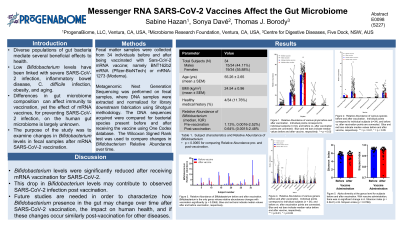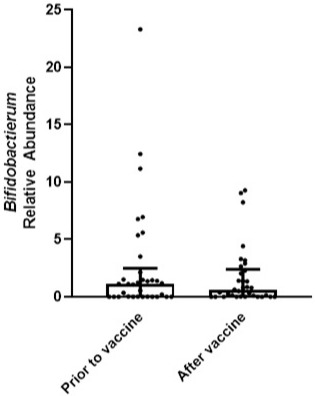Back


Poster Session E - Tuesday Afternoon
Category: Colon
E0098 - Messenger RNA SARS-CoV-2 Vaccines Affect the Gut Microbiome
Tuesday, October 25, 2022
3:00 PM – 5:00 PM ET
Location: Crown Ballroom

Has Audio

Sabine Hazan, MD
ProgenaBiome, LLC
VENTURA, CA
Presenting Author(s)
Sabine Hazan, MD1, Sonya Dave, PhD2, Brad Barrows, DO1, Thomas J. Borody, MD, PhD, DSc, FACG3
1ProgenaBiome, LLC, Ventura, CA; 2North End Advisory, Smyrna, GA; 3Centre for Digestive Diseases, Five Dock, New South Wales, Australia
Introduction: Messenger RNA vaccines for preventing SARS-CoV-2 infection are widely used yet their effect on the gut microbiome is not known. Low bifidobacteria levels have been linked with severe SARS-CoV-2 infection, inflammatory bowel disease, Clostridioides diffícile infection, obesity and aging. Preliminary case reports suggest fecal microbiota transplant could cure SARS-CoV-2 infection (1). A study by Bozkurt et al. showed that SARS-CoV-2 patients taking bifidiobacteria-containing probiotics had lower COVID-related hospitalization times (2).
Methods: 34 subjects had stool collection prior to vaccination and one month post vaccination to evaluate the relative abundance of bifidobacteria in the gut. DNA was extracted, library was prepped, and enrichment and sequencing were done using metagenomic next generation sequencing.
Results: Relative abundance of genus bifidobacteria significantly decreased to about half of original value after vaccination (P = 0.0065 via Wilcoxon signed rank test). Prior to vaccination, median (interquartile range) values of relative abundance for genus bifidobacteria were 1.13% (0.0016% to 2.52%) and after vaccination were 0.64% (0.0015% to 2.48%).
Discussion: Bifidobacteria, included in the $1 billion industry of probiotics, has been shown to be critical in inflammatory diseases, severe COVID-19, obesity, and the aging process. Our results, although preliminary suggest that SARS COV-2 mRNA vaccine decreases levels of bifidobacteria (P = 0.0065). Future studies will be needed to characterize the time course of this decrease in bifidobacteria abundance, its impact on human health, and whether or not similar findings are seen with other vaccines.
1. Biliński J, Winter K, Jasiński M, et al. Rapid resolution of COVID-19 after faecal microbiota transplantation. Gut. 2022;71(1):230-232. doi:10.1136/gutjnl-2021-325010
< !2. Bozkurt HS, Bilen Ö. Oral booster probiotic bifidobacteria in SARS-COV-2 patients. Int J Immunopathol Pharmacol. 2021;35:20587384211059677. doi:10.1177/20587384211059677

Disclosures:
Sabine Hazan, MD1, Sonya Dave, PhD2, Brad Barrows, DO1, Thomas J. Borody, MD, PhD, DSc, FACG3. E0098 - Messenger RNA SARS-CoV-2 Vaccines Affect the Gut Microbiome, ACG 2022 Annual Scientific Meeting Abstracts. Charlotte, NC: American College of Gastroenterology.
1ProgenaBiome, LLC, Ventura, CA; 2North End Advisory, Smyrna, GA; 3Centre for Digestive Diseases, Five Dock, New South Wales, Australia
Introduction: Messenger RNA vaccines for preventing SARS-CoV-2 infection are widely used yet their effect on the gut microbiome is not known. Low bifidobacteria levels have been linked with severe SARS-CoV-2 infection, inflammatory bowel disease, Clostridioides diffícile infection, obesity and aging. Preliminary case reports suggest fecal microbiota transplant could cure SARS-CoV-2 infection (1). A study by Bozkurt et al. showed that SARS-CoV-2 patients taking bifidiobacteria-containing probiotics had lower COVID-related hospitalization times (2).
Methods: 34 subjects had stool collection prior to vaccination and one month post vaccination to evaluate the relative abundance of bifidobacteria in the gut. DNA was extracted, library was prepped, and enrichment and sequencing were done using metagenomic next generation sequencing.
Results: Relative abundance of genus bifidobacteria significantly decreased to about half of original value after vaccination (P = 0.0065 via Wilcoxon signed rank test). Prior to vaccination, median (interquartile range) values of relative abundance for genus bifidobacteria were 1.13% (0.0016% to 2.52%) and after vaccination were 0.64% (0.0015% to 2.48%).
Discussion: Bifidobacteria, included in the $1 billion industry of probiotics, has been shown to be critical in inflammatory diseases, severe COVID-19, obesity, and the aging process. Our results, although preliminary suggest that SARS COV-2 mRNA vaccine decreases levels of bifidobacteria (P = 0.0065). Future studies will be needed to characterize the time course of this decrease in bifidobacteria abundance, its impact on human health, and whether or not similar findings are seen with other vaccines.
1. Biliński J, Winter K, Jasiński M, et al. Rapid resolution of COVID-19 after faecal microbiota transplantation. Gut. 2022;71(1):230-232. doi:10.1136/gutjnl-2021-325010
< !2. Bozkurt HS, Bilen Ö. Oral booster probiotic bifidobacteria in SARS-COV-2 patients. Int J Immunopathol Pharmacol. 2021;35:20587384211059677. doi:10.1177/20587384211059677

Figure: Figure 1: Bifidobacterium relative abundance decreases ( P = 0.0065) in subjects (n=34) after vaccination compared to before vaccination in the same subjects. Bars plot median; error bars plot interquartile range.
Disclosures:
Sabine Hazan indicated no relevant financial relationships.
Sonya Dave: McKesson Specialty Health / Ontada – Employee.
Brad Barrows indicated no relevant financial relationships.
Thomas Borody: Axent medical Pty. Ltd – Advisory Committee/Board Member. Centre for Digestive Diseases – Advisory Committee/Board Member, Consultant, Employee, Grant/Research Support, Intellectual Property/Patents, Ownership interest, Owner/Ownership Interest, Stock-privately held company. Finch Therapeutics – Advisory Committee/Board Member, Intellectual Property/Patents, Stock-publicly held company(excluding mutual/index funds). Topelia Therapeutics – Advisor or Review Panel Member, Intellectual Property/Patents.
Sabine Hazan, MD1, Sonya Dave, PhD2, Brad Barrows, DO1, Thomas J. Borody, MD, PhD, DSc, FACG3. E0098 - Messenger RNA SARS-CoV-2 Vaccines Affect the Gut Microbiome, ACG 2022 Annual Scientific Meeting Abstracts. Charlotte, NC: American College of Gastroenterology.

